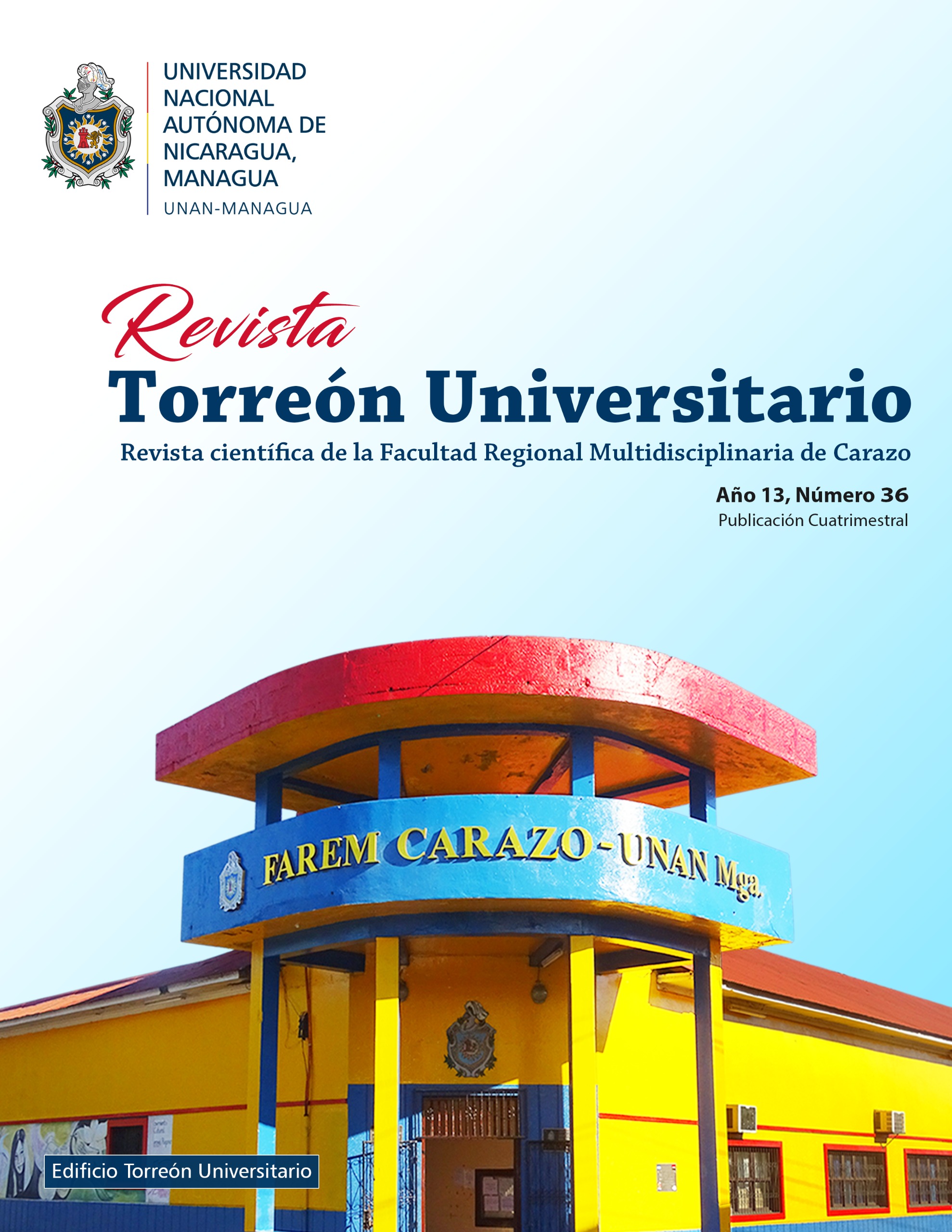Analysis of Tax Revenue Collection period 2007-2020
DOI:
https://doi.org/10.5377/rtu.v13i36.17628Keywords:
Tax revenue, Tax Policy, Tax Pressure, Tax Collection, Progressive System, Tax System, Regressive SystemAbstract
The main objective of this research work is to carry out an analysis of the public finances of Nicaragua focused on the collection of tax revenues and to verify that the Nicaraguan tax system has undergone notable changes with the implementation of tax policies, that is, to reduce the gap of regressiveness and approach a more progressive system that is fair and equitable in fiscal terms.
The regressivity gap of the Nicaraguan tax system has been significantly reduced in the last 14 years, the regressivity for the year 2007 was 69.7% in the course of the collection time series analyzed, it was determined that for the year 2020 the regressivity is of 56.3%, that is, the fiscal policy of reducing the fiscal burden in indirect taxes has had notable effects, while the progressiveness of the system is significantly visible given that wealth is being taxed more for the year 2007, the progressiveness was 30.3% and in the year 2020 was 43.7%. It should be noted that the growing evolution of tax revenue collection has allowed these changes in the collection system to be notable in fiscal matters.
Downloads
References
Artana, D. “Evaluación Reciente de la Recaudación Tributaria, Gastos Fiscales y Proyecciones Fiscales”. (2005).
Báez, Julio y Báez Teódulo. “Todo Sobre Impuestos en Nicaragua”. 7ª Edición- Managua (2007).
Banco Central de Nicaragua Informe Anual 2010-2020.
Canales J., Soto U. y Chavarría A. 2009. ‘‘Revisión e incorporación del Gasto Tributario en El Presupuesto General de La República’’.Centro Regional de Asistencia Técnica de Centroamérica, Panamá y República
CEPAL, Villela L., Lemgruber A. Y Jorratt M. 2009. ‘‘Los Presupuestos de Gastos Tributarios’’.
CEPAL. Jiménez JP., Sabaini J C. Y Podesta A.2009 ‘‘Equidad y Evasión en América Latina.
Jorrat (2012). “Medición de Gasto Tributario: Informe de Asistencia Técnica”. Dominicana.
Mann, A. Y Burke R. ‘‘El Gasto Tributario en Guatemala, 2002’’.
Ministerio de Economía y Finanzas Públicas. “Estimación de los Gastos Tributarios para los años 2009 a 2011”. Preparado por la Dirección Nacional de Investigaciones y Análisis Fiscal.” (2012).
Ministerio de Economía Y Finanzas. ‘‘Estimación de Los Gastos Tributarios para los años 2008 a 2009’’. Argentina.
Ministerio de Hacienda de República dominicana. “Gastos Tributarios en República Dominicana: Estimación para el Presupuesto General del Estado del año 2013. Comisión Interinstitucional Coordinada por la Dirección de Política y Legislación Tributaria (2012).
Ministerio de Hacienda y Crédito Público de Nicaragua Comprendido Estadístico de las finanzas públicas de Nicaragua 2000-2012.
Ministerio de Hacienda y Crédito Público de Nicaragua. “El Gasto Tributario en Nicaragua”. Preparado por Julio Cardoza para el MHCP en el marco del Programa de Fortalecimiento de la Preparación Fiscal del BID (2010).
OCDE (Organización para la Cooperación y el Desarrollo Económico) (2001), “Measuring Capital-OECD Manual”.
Servicio de Impuestos Internos Chile. “Estimación de la Evasión en el Impuesto a la Renta de las Empresas Serie 2009-2009” (2012).
SIMONIT S. 2001. ‘‘Los Gastos Tributarios y Las Renuncias Tributarias en América Latina’’
Superintendencia de Administración Tributaria. ‘‘Estimación del Gasto Tributario del Gobierno Central, 2005 y 2006’’. BARRA P.Guatemala.
Vallecio R. 2005. ‘‘Estudio y Análisis de Sacrificio Fiscal En Nicaragua.
Villela, Luiz, Andrea Lemgruber y Michael Jorrat. “Gastos Tributarios: La Reforma Pendiente”
Published
How to Cite
Issue
Section
License
Copyright (c) 2024 Universidad Nacional Autónoma de Nicaragua, Managua

This work is licensed under a Creative Commons Attribution-NonCommercial-NoDerivatives 4.0 International License.
Los autores que publican en esta revista están de acuerdo con los siguientes términos.
- El autor o los autores de los artículos, ensayos o investigaciones conceden a la Universidad Nacional Autónoma de Nicaragua, Managua (UNAN-Managua) los derechos de edición (copyright) del trabajo enviado, por consiguiente la Universidad cuenta con el derecho exclusivo para publicar el artículo durante el periodo completo de los derechos de autor.
- Estos derechos de autor/ autores autorizan a la Revista Torreón Universitario y a la Universidad editar y divulgar/publicar el artículo en dicha Revista, incluyendo reproducción impresa y electrónica, el almacenamiento, recuperación y cualquier otro tipo de publicación, y fuentes de información secundaria como servicios de resúmenes y bases de datos, así mismo la facultan a proteger el artículo contra el uso no autorizado para su difusión por medios impresos o electrónicos (PDF, HTML, EPUB, XML u otros).
Licencia para el uso del contenido
La revista hace uso de la Licencia Creative Commons Atribución-NoComercial-SinDerivar 4.0 Internacional.
Bajo esta declaración:

Este revista está sujeta a una licencia de Creative Commons Reconocimiento-NoComercial-SinObraDerivada 4.0 Internacional. Puede ser copiada, distribuida y transmitida públicamente siempre y cuando se cite al autor y la fuente (Revista Torreón Universitario), no debe modificarse ni utilizarse con ningún fin comercial. La licencia completa se puede consultar en http://creativecommons.org/licenses/by-nc-nd/4.0/.

